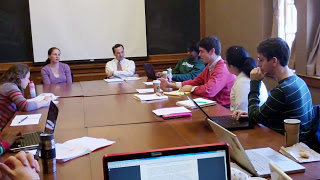- Public Policy
- Leadership
- Funding
- News & Events
- About the Center
Back to Top Nav
Back to Top Nav
Back to Top Nav
Back to Top Nav
It's time for Winter 2012 course selection! We are happy to announce a brand new offering:
PBPL 52: Leadership in Political Institutions
Professor Linda Fowler, 12W:2AThis course explores how political leaders in the U.S. reconcile the constraints of public office with the opportunities to make major changes in society. Drawing from diverse materials on the executive, legislative and judicial branches of government, the course explores the following questions: How does leadership differ in the public and private spheres? What personal skills and attributes affect the success or failure of leaders of political institutions? What criteria do/should citizens apply to public leaders? How do political context and historical contingency shape institutional leadership? Dist: SOC; WCult: W.
Also Available:

PBPL 48: Policy Analysis and Local Governance
Professor Andrew Samwick, 12W: 10AThis course analyzes the public policy challenges faced by local communities and serves as a gateway to the Rockefeller Center's Policy Research Shop. Particular emphasis will be placed on the problems of urban areas, including education, crime, poverty, economic development, housing, and transportation. Throughout the course, students will use both New Hampshire and Vermont to study how specific communities have attempted to address these challenges. The course examines the roles of various actors--citizens, non-profits, and government agencies at all levels--in effecting positive change in local public policy outcomes. Dist: SOC; WCult: W.
PBPL 84.2: Health Policy Reform
Professor Ellen Meara, 12W: 10AThe goal of the course is to analyze likely strengths and weaknesses of U.S. health reform to address three major challenges in the health care system: access, cost, and quality of health care. To do this, students will study key elements of the Patient Protection and Affordable Care Act enacted in March, 2010, considering how it extends or differs from prior health policies to address enduring problems in health care. In addition to readings, class discussion and in-class exercises (debates and policy simulations), course work will incorporate brief exercises designed to introduce students to commonly used sources of health data, and analytical approaches. Students will explore one aspect of health reform in detail, preparing and presenting a short research project on an approved topic. Prerequisites - at least one of the following: Public Policy 5, Public Policy 26, or Sociology 28. Government 10, Economics 10 or similar course is helpful.
Dist: SOC; WCult: W.